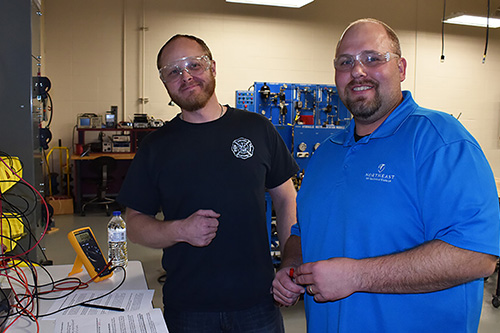Electrical Engineering Technology - Associate Degree
As an Electrical Engineering Technology (EET) graduate, you're skilled in testing, maintaining, and troubleshooting electrical and electronic devices found in machinery, computers, and communication. Typical careers for program grads include electrical/electronic development technician, electrical/electronic maintenance technician, electrical test technician, electrical/electronics technician, and field service technician.
Program Costs & Financial Aid
See costs of tuition, books, and supplies.This program is fully eligible for financial aid.
Estimates based on in-state residency. Learn more about tuition and fees.
Explore Locations
Follow Your Path
Ask your advisor about 2+2 transfer opportunities.
Delivery
Complete lab activities for this program at the Engineering Technology Center – whenever it’s convenient for you. The lab is open days, evenings, and Saturdays. View center hours and take a virtual tour!
How do I get started in this program?
Requirements for Program Entry
- Apply at www.nwtc.edu/apply.
- Submit the following to transcripts@nwtc.edu: • High school transcript (or GED/HSED transcript). • College transcript.
- If your cumulative GPA is below 2.6, complete or submit a placement evaluation. Tip! Our admission advisors will assist you through every step. Have questions? Connect with NWTC Admissions at start@nwtc.edu or 920-498-5444.
What are my courses?
Curriculum
Students following the study plan below will complete the Electrical Engineering Technology associate degree in the number of semesters shown.
First Semester
8 Week 1
8 Week 2
Full Semester
Second Semester
8 Week 1
8 Week 2
Full Semester
Summer Before Third Semester
Third Semester
8 Week 1
8 Week 2
Full Semester
Fourth Semester
8 Week 1
8 Week 2
Full Semester
- Curriculum Note: Students must earn a grade of C or better in 10-801-136, English Composition to enroll in 10-801-197, Technical Reporting.
- The credit for 10-890-101, College 101 is an Institutional Requirement for graduation. Consequently, it is not part of the program requirements, but must be passed with a "C' or better.
Program Outcomes
- Apply electronic theory to practice.
- Operate test equipment.
- Build electronic circuits and systems.
- Evaluate the operation of electronic circuits or systems.
- Communicate technical information.
What careers are in my future?
Graduate Employment
with 100% in field
Employment Potential
A graduate of this program will have the potential for employment in the following areas:
- Electrical/Electronic Development Technician: assists engineers in the design and development of experimental and prototype equipment and products.
- Electrical/Electronic Maintenance Technician: services and programs in-plant automatic control equipment, computers, robots, and other equipment.
- Electrical Test Technician: tests, troubleshoots, and inspects electrical/electronic products (quality control testing).
- Electrical/Electronics Technician: maintains equipment including motor controllers, cables, communication equipment, computers, security systems, CNC equipment, programmable controllers, robots, and automatic production equipment; works with engineers in building breadboard and prototype devices; and evaluates and tests electronic devices and systems.
- Field Service Technician: services and overhauls equipment in the customer’s facility; works with sales personnel; and demonstrates new equipment to potential customers.
Employment opportunities with additional education
- Computer Field Service Supervisor
- Electrical/Electronics Production Superintendent
- Electrical/Electronics Maintenance Supervisor
- Field Service Engineer
- Electrical Engineer
What's next after graduation?
Start here. Finish at a four-year.
NWTC transfer programs are offered through collaborative agreements with our four-year college and university partners. See where your associate degree credits will transfer.
What else do I need to know about the program?
Study Abroad Opportunities
The International Programs staff continually seeks opportunities for students to travel abroad for educational experiences that may be offered in association with program courses.
Related Programs
- Online
-
Classes wherever you have an internet connection.
- An in-person career experience, such as an internship, practicum, or credit for prior learning, may be required.
- Some online courses may be held at specific dates/times.
- Day
- Classes between the hours of 6:00 a.m. and 5:30 p.m.
- Evening
- Classes between the hours of 5:30 p.m. and 10:30 p.m.
- Weekend
- A combination of online classes and Saturday and/or Sunday classes.
- Full-time
- 12 or more credits per term.
- Part-time
- Fewer than 12 credits per term.
